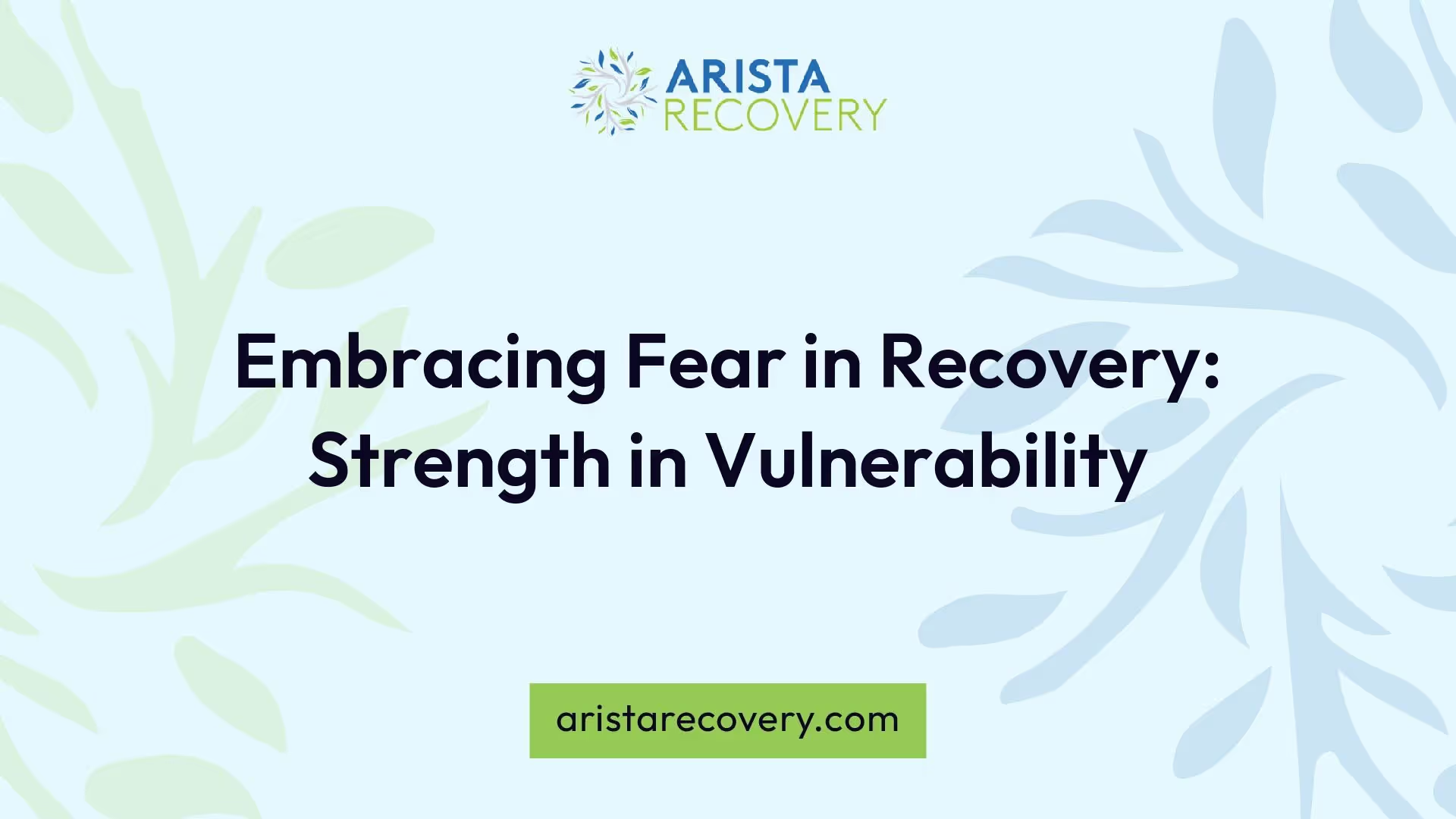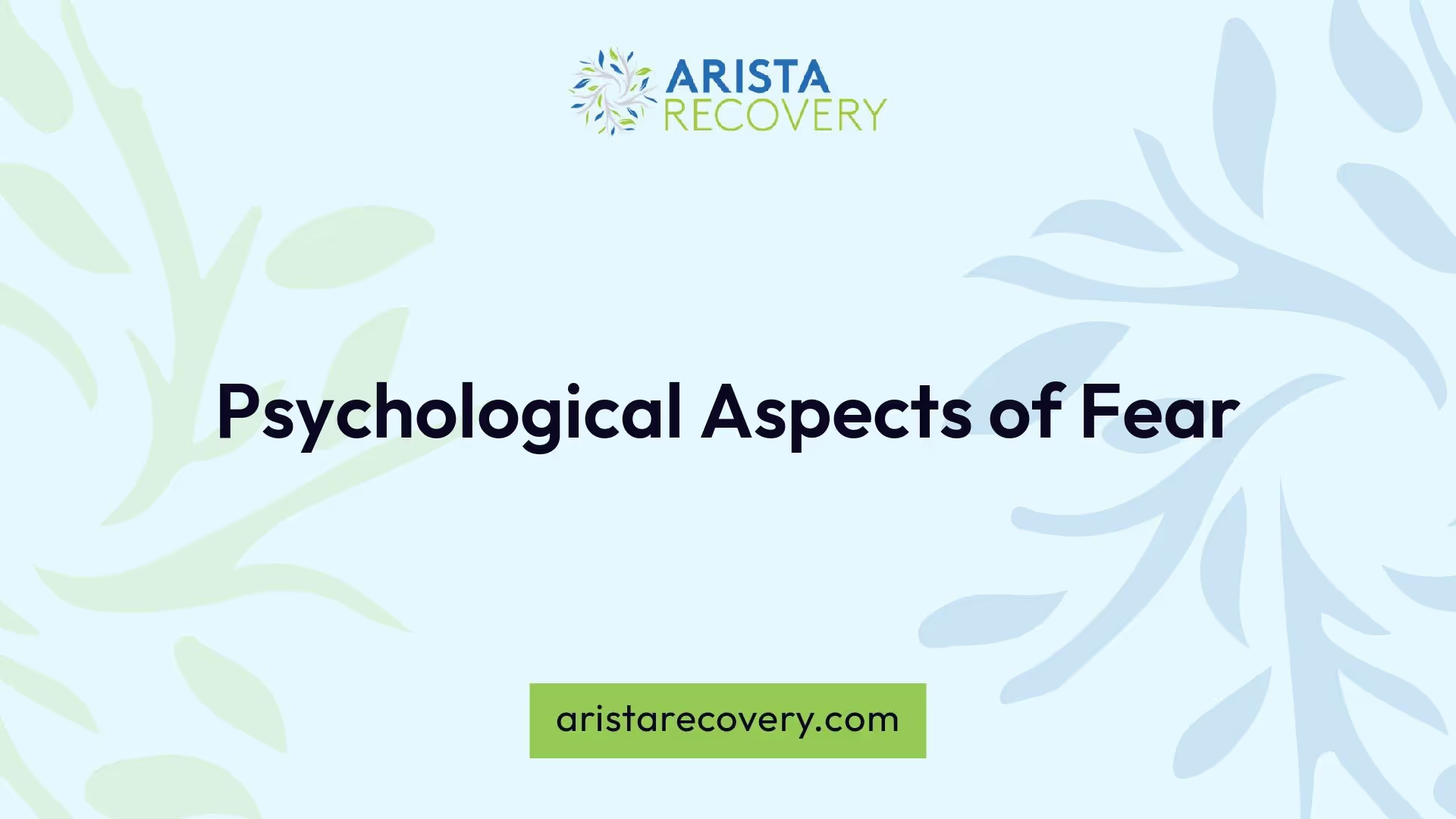Embracing Fear in Recovery: Strength in Vulnerability

Understanding Fear in Recovery

Impact of Fear on Addiction Recovery
Fear can have a profound impact on addiction recovery. For many individuals, it serves as both a barrier and a catalyst in their journey toward wellness. People often find comfort in the familiar patterns of addiction, even though these may be detrimental. The thought of facing life without substances can be intimidating and makes the prospect of recovery daunting. This fear of the unknown can prevent individuals from seeking help or making necessary changes in their lives.
Fear can manifest in several ways during the recovery process. Common fears include the fear of failure, the fear of relapse, and the fear of change. These fears can significantly hinder progress, causing individuals to hesitate in pursuing a healthier lifestyle. Understanding these fears is essential for effective recovery strategies, as they can dictate an individual’s willingness to embrace changes that lead to a healthier and fulfilling life [2].
The fear of relapse is particularly prevalent among those in recovery. Developing coping mechanisms to manage this fear can empower individuals to navigate their recovery journey more effectively. Useful strategies include identifying triggers, creating a relapse prevention plan, and engaging in supportive environments such as group meetings.
Common Fears in Recovery
Fear is often a driving force behind addictive behavior and continues to be a significant hurdle during recovery. Many individuals experience fears whether they are considering entering treatment or are already undergoing it. These fears can take various forms, including anxiety about relapse, uncertainty about the future, or the fear of not fitting in after sobriety. Acknowledging these fears is a crucial step in the recovery process.
Recognizing and addressing common fears in recovery can greatly enhance an individual's chances of success. It is important for individuals to learn from these fears rather than let them dictate their actions. By identifying fears and understanding their sources, individuals can confront these challenges head-on, which is essential for lasting recovery [3].
Managing Fear Effectively
Fear in recovery can be a significant barrier to achieving sobriety. However, by employing effective coping strategies and overcoming the fear of change, individuals can navigate their recovery journey with greater confidence.
Coping Strategies for Fear
Managing fear effectively involves using specific techniques to help alleviate anxiety and stress related to recovery. Some effective coping strategies include:
- Deep Breathing Exercises: Focusing on breath can help calm the mind and reduce feelings of panic.
- Journaling: Writing down thoughts and feelings provides an outlet for expressing fears and can help in processing emotions.
- Mindfulness Practices: Engaging in mindfulness can ground individuals in the present moment, reducing overwhelming feelings associated with fear.
- Creative Outlets: Activities such as painting or music can serve as a distraction and a positive form of expression.
Using these strategies helps individuals regulate their emotions, minimize anxiety, and regain control over their thoughts.
Overcoming Fear of Change
Change can be daunting during recovery, and many individuals experience fear regarding the unknown. To overcome this fear of change, individuals can take the following steps:
- Take It One Day at a Time: Focusing on daily goals rather than long-term outcomes makes the process less overwhelming.
- Set Realistic Goals: Breaking larger goals into smaller, manageable steps allows for gradual progress without the pressure of immediate perfection [1].
- Build a Strong Support System: Engaging with family members, friends, or support groups helps individuals address their fears and feel understood. Group settings provide a safe space for sharing experiences, which can increase motivation to confront fears.
Facing change becomes easier when individuals feel supported and capable of managing their emotions. For those navigating this process, understanding common fears, including the fear of relapse or the fear of sobriety, can further aid in reducing anxiety related to these changes.
Psychological Aspects of Fear

Understanding the psychological aspects of fear is critical in the recovery journey. Fear can serve as both a motivating force and an impediment. It's essential to recognize common techniques and strategies that can help individuals cope with their fears effectively.
Cognitive Therapy Techniques
Cognitive therapy techniques play a vital role in managing fear during recovery. These methods focus on identifying and challenging negative thought patterns that can exacerbate feelings of fear and anxiety. Some common techniques include:
- Cognitive Restructuring: This technique involves recognizing distorted thinking and replacing it with more balanced and rational thoughts.
- Exposure Therapy: Gradual exposure to feared situations can help desensitize an individual, enabling them to confront their fears in a safe manner.
- Positive Affirmations: Encouraging self-affirmation can help counter negative thoughts and promote a more positive mindset.
Implementing these techniques allows individuals to regain a sense of control over their thoughts and emotions which is crucial when facing the challenges of recovery. More detailed methods can be explored in resources surrounding fear in recovery.
Setting Realistic Goals
Setting realistic goals is an essential component in navigating fear in recovery. Goals should be specific, achievable, and tailored to individual circumstances. Here are some strategies for effective goal-setting:
By setting clear and attainable goals, he or she can create a roadmap for their recovery journey. This structure helps individuals track their progress and fosters a sense of accomplishment, which can alleviate feelings of fear and doubt. Creating a solid support system can also enhance motivation as individuals share their goals and achievements within the group environment Northstar Behavioral Health.
Building Support Networks
Support networks play a crucial role in managing fear in recovery. Individuals navigating the complexities of addiction can benefit greatly from surrounding themselves with people who understand their journey.
Importance of Support Systems
A supportive network serves as a powerful tool for individuals in recovery, offering comfort, understanding, encouragement, guidance, and accountability. This network can include family members, friends, mentors, therapists, or support groups. Each connection provides motivation to overcome fear and face the challenges of recovery head-on.
Research indicates that individuals with strong social support are more likely to maintain their recovery over time. Having people to share struggles and successes helps reduce feelings of isolation and fear. Below is a table summarizing the benefits of having a solid support system:
Professional Guidance and Counseling
In addition to personal support networks, professional guidance is essential for effective recovery. Therapists and counselors provide specialized knowledge and techniques tailored to individual needs. They can help clients develop effective coping strategies for managing fear and anxiety [4].
Professional guidance may include cognitive-behavioral therapy (CBT) techniques, which focus on changing negative thought patterns that contribute to fear in recovery. These mental health professionals can also help set realistic goals, empowering individuals to confront their fears while fostering personal growth and resilience.
Support from professionals can also facilitate connections to local resources and support groups, which can be invaluable for those facing specific fears or challenges in their recovery journeys. Techniques such as ongoing support and providing understanding are instrumental for effectively coping with fear and anxiety.
By actively building a support network that includes both personal contacts and professional assistance, individuals can create a comprehensive system that addresses their unique needs during the recovery process, ultimately reducing the impact of fear on their journey.
Facing Specific Fears
In the journey of recovery, individuals often encounter various specific fears that can impede their progress. Among these, the fear of relapse and handling emotional challenges are particularly significant.
Fear of Relapse
The fear of relapse is common among those in recovery. Many individuals worry that returning to previous addictive behaviors is inevitable even after making progress. Understanding this fear and developing effective coping mechanisms is essential. Strategies includes identifying triggers, creating a relapse prevention plan, focusing on personal goals, and attending support groups. These techniques can help individuals navigate the challenges of their recovery journey [2].
Relapse is a possibility in recovery, but it does not indicate failure. Overcoming this fear involves reaching out for help and utilizing available resources such as therapy, support groups, and 12-step programs [5].
Handling Emotional Challenges
Adapting to the emotional shifts experienced during recovery can be daunting. Many individuals fear dealing with emotions because addictive behaviors are often linked to deeper psychological struggles. This fear can result in avoidance behaviors that hinder recovery.
Therapeutic support through effective behavioral therapies like Cognitive Behavioral Therapy (CBT) and Dialectical Behavior Therapy (DBT) can significantly assist individuals in managing stress, enhancing emotional tolerance, and developing sustainable coping techniques for complex emotions that emerge during recovery [7].
Access to supervised medical detoxification with ongoing clinical care can alleviate concerns about withdrawal symptoms, making the recovery process smoother, particularly for substances that may cause severe withdrawal [7].
The mantra "Face Everything and Recover" reminds individuals that confronting addiction while sober is achievable. Taking one step at a time and addressing each day as it comes can provide the strength needed to overcome these fears.
Practical Strategies
Addressing fear in recovery requires practical strategies that can empower individuals to manage their emotions effectively. Two important approaches include mindfulness practices and handling the fear of sobriety.
Mindfulness Practices
Mindfulness practices are valuable tools for managing fear and anxiety during the recovery process. Techniques such as meditation, deep breathing exercises, and grounding techniques enable individuals to focus on the present moment, fostering self-awareness and emotional regulation. By engaging in mindfulness, individuals can cultivate a sense of calm and clarity, which helps in confronting and overcoming fears with resilience [4].
Here are some mindfulness exercises that can be incorporated into daily routines:
These practices can help manage emotional challenges in recovery and provide individuals with greater control over their thoughts and feelings.
Handling Fear of Sobriety
The fear of sobriety often involves concerns related to lifestyle changes and social interactions without substances. Effective strategies to manage this fear include identifying personal triggers, creating a relapse prevention plan, setting realistic goals, and attending support groups [2].
A relapse prevention plan outlines specific strategies for managing cravings and identifying situations that may lead to substance use. Additionally, setting realistic, measurable, attainable, relevant, and time-bound (SMART) goals can keep individuals focused and motivated while highlighting their progress in recovery. Celebrating small achievements reinforces confidence and fosters a sense of empowerment.
Building a strong support system, including family, friends, mentors, and support groups, is essential in overcoming the fear of sobriety. Support groups provide a safe space for sharing fears and experiences, fostering a sense of community and understanding. Engaging in these groups can help individuals feel accepted and motivated to confront their fears.
By integrating mindfulness practices and proactive strategies, individuals in recovery can navigate their fears and challenges more effectively, ultimately leading to a more fulfilling, sober life.
References
[1]: https://www.aacle.org/fear-in-recovery/
[2]: https://www.socialrecoverycenter.com/blog/fear-in-recovery?60ad6923_page=26
[3]: https://www.gatewayfoundation.org/blog/fear-in-addiction-recovery/
[4]: https://www.northstarbehavioralhealthmn.com/resources/fear-in-recovery
[5]: https://www.cleanslatecenters.com/blog/3-common-fears-in-recovery-and-how-to-overcome-them/
[6]: https://www.hopebridgerecovery.com/blog/fear-in-recovery
[7]: https://www.gratitudelodge.com/6-common-phobias-recovery-how-to-face-them/
You’re not alone in this.
When mental health challenges and addiction intersect, it can feel isolating. At Arista, we offer compassionate, evidence-based, and trauma-informed care to help you heal, grow, and move forward.
You’re not alone in this.
When mental health challenges and addiction intersect, it can feel isolating. At Arista, we offer compassionate, evidence-based, and trauma-informed care to help you heal, grow, and move forward.
Support that moves with you.
You’ve taken a brave first step. At Arista Recovery, we’re here to help you continue with best-in-class care designed for long-term healing and support.
.webp)






